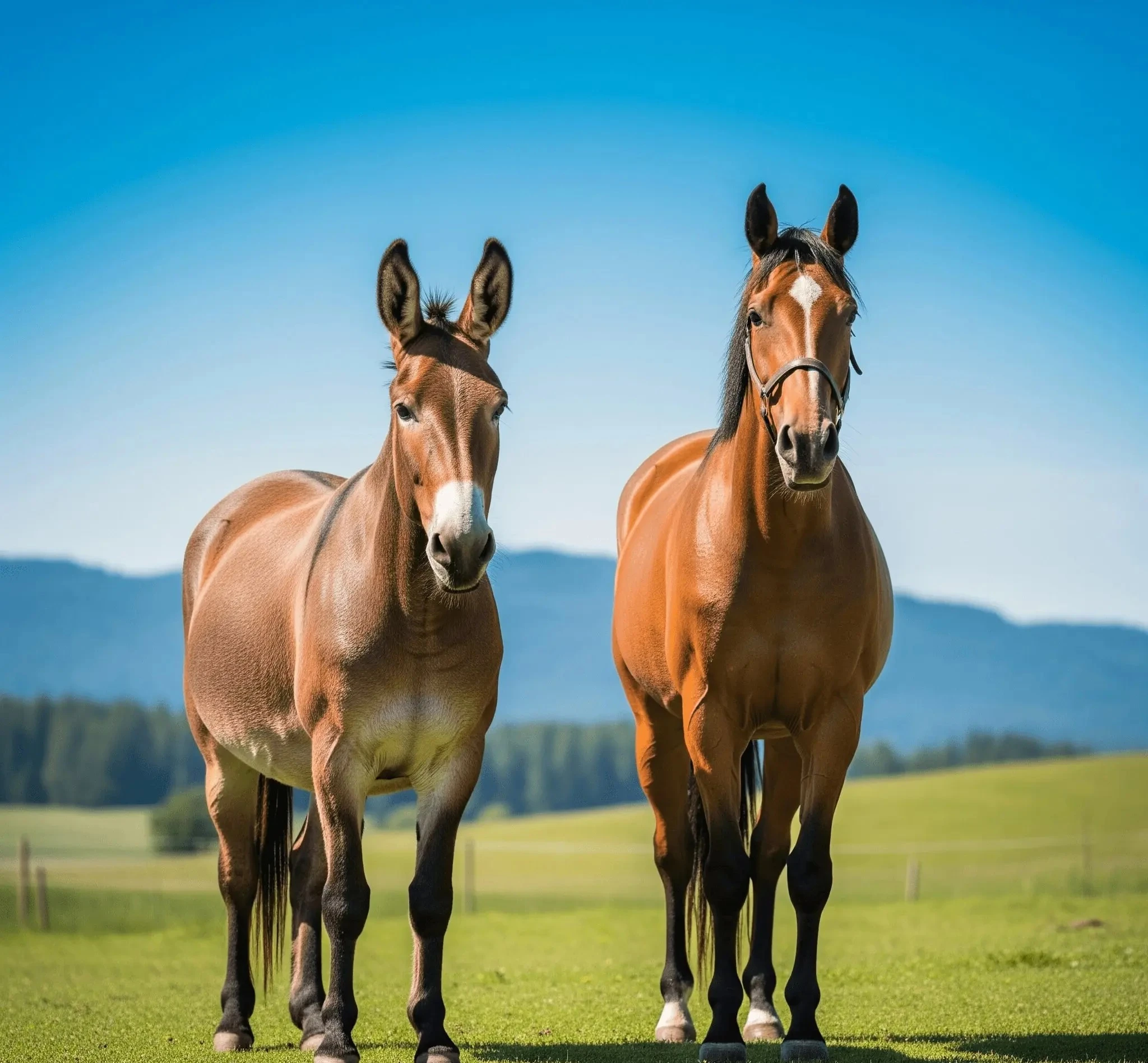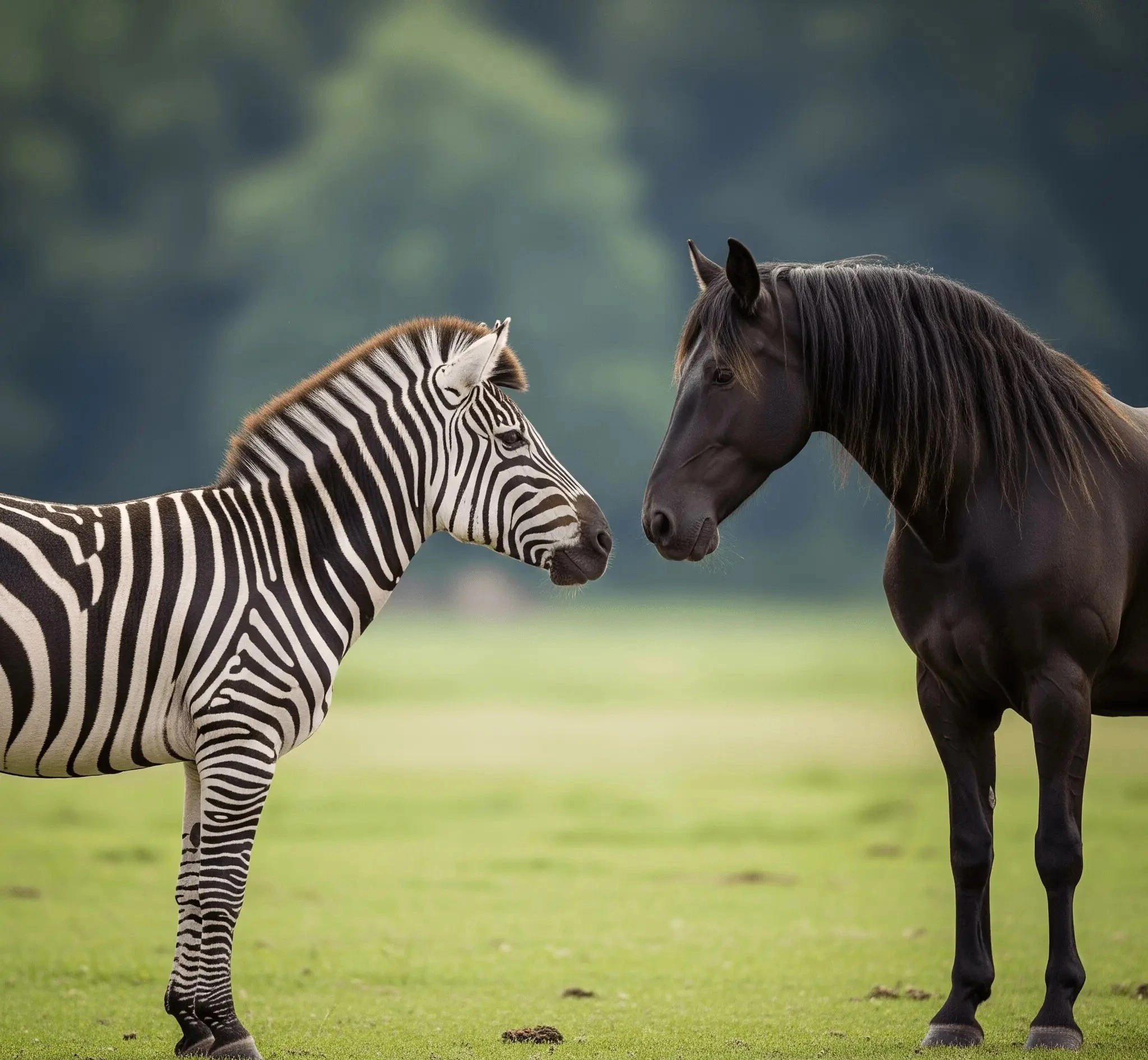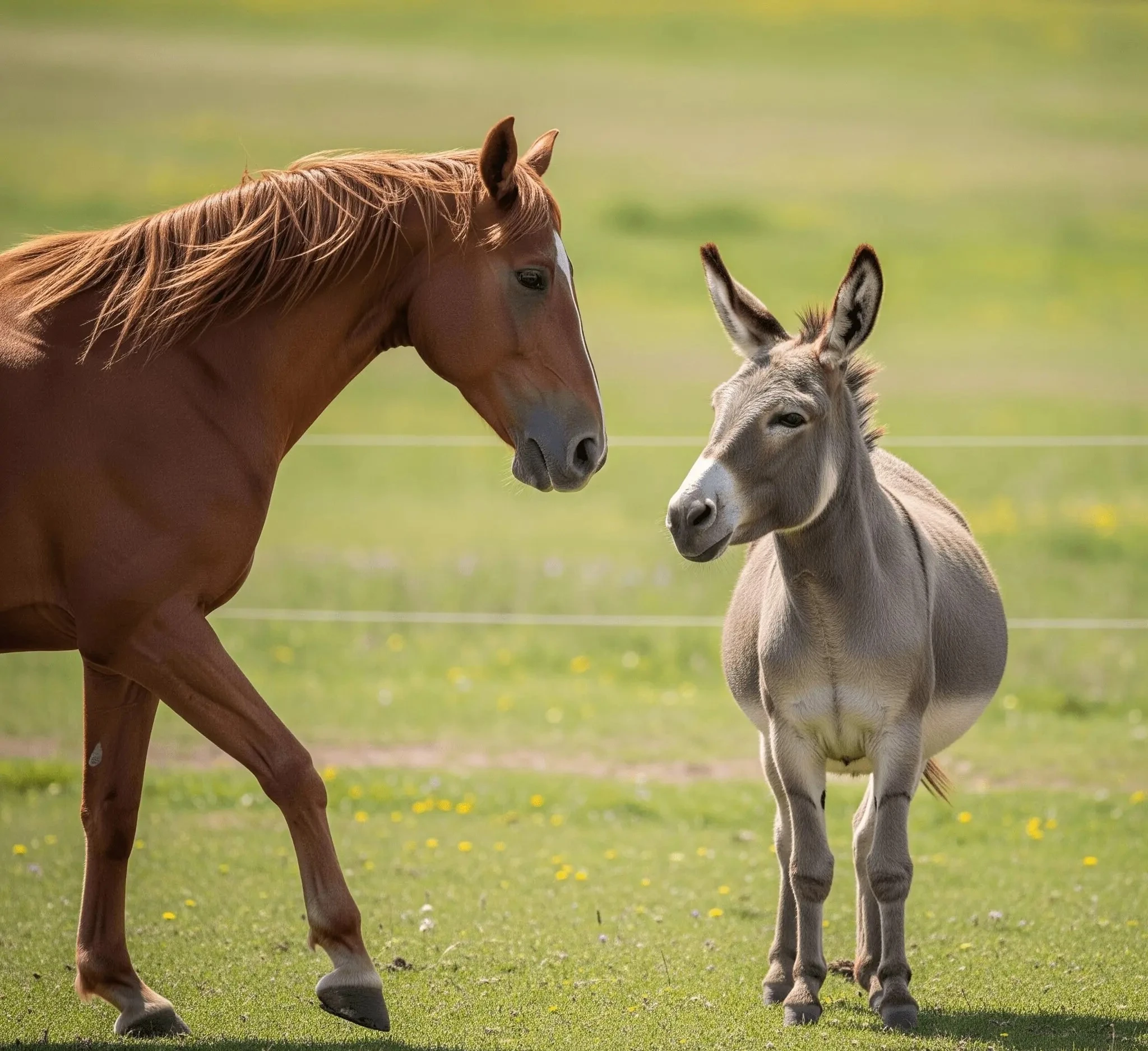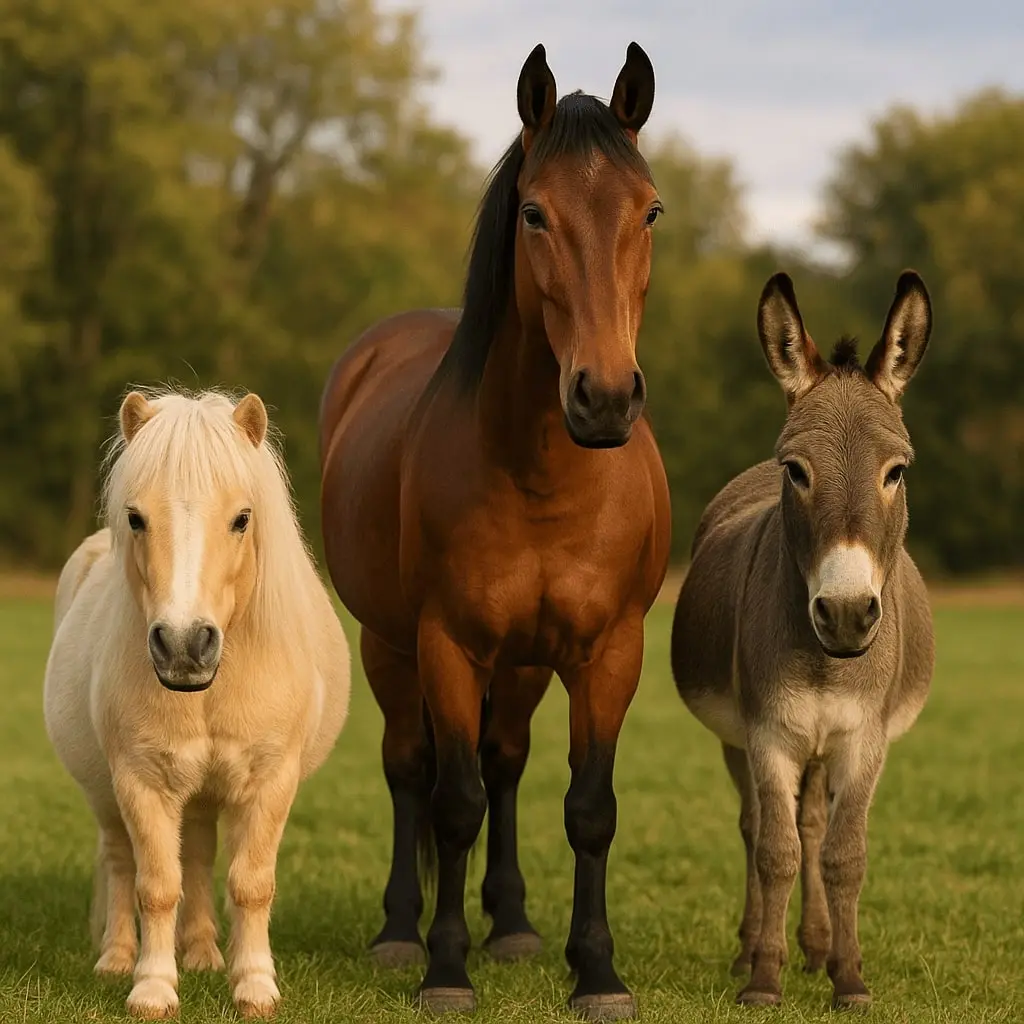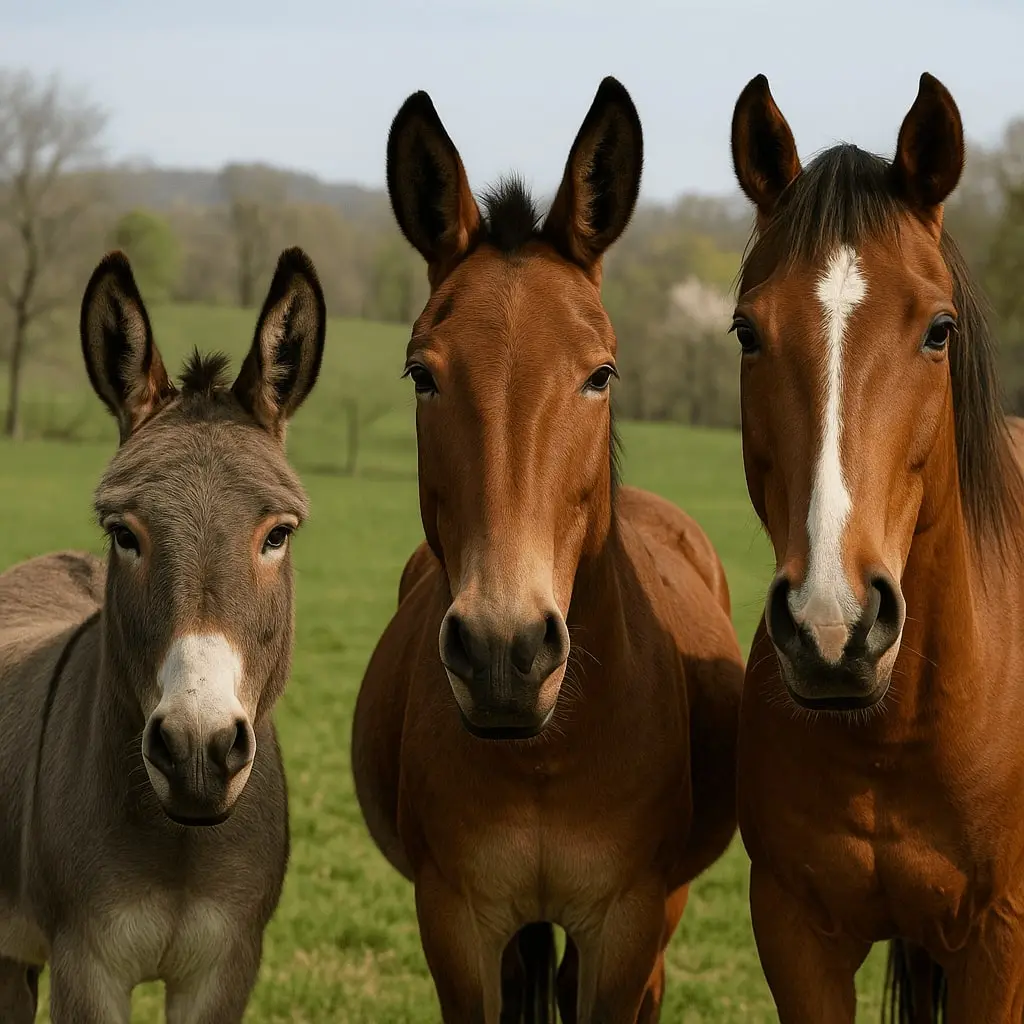When it comes to choosing between a horse vs mule, understanding their differences is crucial. Both animals have played significant roles in human history, but they possess unique characteristics that may make one more suitable than the other for specific tasks. In this guide by I Heart Horses, we’ll explore the origins, physical traits, behavior, training, health, care, performance, costs, and provide a comparative analysis to help you decide which is the better fit for your needs.
Note: “We use trusted facts and real experience to help you understand the benefits of mules.”
Horse vs Mule: Let’s Dive
Now let’s dive into horse vs mule and know what are the key differences in both:
Origins and Genetics
Horse Origins
Horses (Equus ferus caballus) were domesticated around 4,000 BCE in Central Asia. Over time, various breeds have been developed for specific purposes, including racing, work, and companionship. Horses typically have 64 chromosomes and are known for their speed, agility, and strong herd instincts.
Mule Origins
Mules are hybrids resulting from the mating of a male donkey (Equus asinus) and a female horse. This crossbreeding combines the endurance and sure-footedness of donkeys with the strength and stamina of horses. Mules inherit 63 chromosomes, making them sterile and unable to reproduce. Their unique genetic makeup contributes to their resilience and adaptability.
Physical Characteristics
Size and Build
- Horses: Generally taller and leaner, horses can weigh between 900 to 2,200 pounds, depending on the breed. Their height ranges from 4.5 to 6 feet at the shoulder.
- Mules: Mules are typically shorter and more compact, weighing between 800 to 1,400 pounds. Their sturdy build makes them well-suited for carrying heavy loads over rough terrains.
Ears and Tail
- Horses: Possess short, pointed ears and long, flowing tails.
- Mules: Feature longer ears, a trait inherited from donkeys, and tails that are a blend between horse and donkey tails.
Hooves
- Horses: Have hooves that require regular trimming and sometimes shoeing, depending on their activity level and terrain.
- Mules: Often have harder hooves, which can reduce the need for frequent shoeing and make them more durable on rugged surfaces.
Temperament and Behavior
Horses: Horses are social animals that thrive in herds. They are generally responsive to training and can form strong bonds with humans. However, they may be more reactive to sudden movements or unfamiliar situations, requiring consistent training and handling.
Mules: Mules are often perceived as more independent and cautious. Their intelligence and problem-solving abilities can make them appear stubborn, but this behavior is typically a result of careful consideration rather than obstinacy. Mules tend to be less skittish and more reliable in challenging situations.
Training and Intelligence
Horses: Horses are quick learners and can be trained for various disciplines, including dressage, jumping, and racing. Their eagerness to please often facilitates the training process, though they may require firm and consistent handling to maintain discipline.
Mules: Mules are highly intelligent and can excel in tasks that require problem-solving and endurance. Their training may take longer due to their cautious nature, but once trained, they often perform tasks with precision and reliability.
Health and Longevity
Horses: The average lifespan of a horse ranges from 25 to 30 years, though some can live longer with proper care. Horses are prone to certain health issues, including colic, joint problems, and respiratory conditions, necessitating regular veterinary check-ups and a balanced diet.
Mules: Mules often live longer than horses, with some reaching 35 to 40 years. Their hardiness and resistance to certain diseases contribute to their longevity. Mules generally require less veterinary care and are less susceptible to common equine ailments.
Maintenance and Care
Horses: Maintaining a horse involves regular feeding, grooming, hoof care, and exercise. Horses require a balanced diet rich in fiber, such as hay and grass, along with access to clean water. They also need shelter from extreme weather conditions and regular veterinary care.
Mules: Mules are easier to maintain, requiring less food and simpler diets. Their hardier nature means they can often thrive in more rugged conditions. While they still need shelter and veterinary care, their overall maintenance is generally less demanding than that of horses.
Performance and Versatility
Horses: Horses are versatile animals used in various fields, including agriculture, transportation, sports, and therapy. Their speed and agility make them ideal for racing and competitive events, while their strength is utilized in draft work.
Mules: Mules are renowned for their endurance and sure-footedness, making them excellent choices for tasks requiring sustained effort over challenging terrains. They are commonly used in pack work, forestry, and mountainous regions where their stability and strength are advantageous.
Cost Considerations
Horses: The initial cost of purchasing a horse can vary widely based on breed, training, and purpose. Ongoing expenses include feed, veterinary care, grooming supplies, and equipment. Horses may also incur additional costs for training and boarding.
Mules: Mules often have a lower initial purchase price compared to horses. Their reduced maintenance needs and longer lifespan can make them more cost-effective in the long run. However, specialized equipment may be necessary for handling and riding mules.
Why Mules Are Better Than Horses

When people choose animals for work or riding, they often wonder if horses or mules are better. From our many years of experience working with both, we know that mules have many special qualities. A mule is a mix of a donkey and a horse. This gives it the best traits from both animals. Mules are very strong and can work hard for a long time. They are also smart and careful, which helps them stay safe on rough land. Unlike horses, mules usually live longer and get sick less often. Because of this, they cost less to take care of.
“We use trusted facts and real experience to help you understand the benefits of mules.”
- Stronger for Their Size
Mules can carry more weight compared to their body size than horses can. They can carry up to 30% of their body weight, while horses typically carry around 20%. This makes mules excellent for tasks like hauling heavy loads or working long hours without getting tired. Their strength allows them to perform demanding jobs efficiently. This trait is especially useful in agriculture and transportation, where heavy lifting is often required. Mules’ superior strength makes them invaluable assets in various work environments. - Longer Lifespan
Mules often live longer than horses, sometimes up to 50 years. This extended lifespan means they can continue working for many years, providing a long-term investment for their owners. Their longevity also reduces the need for frequent replacements, saving time and money. With proper care, mules can remain active and healthy well into their senior years. This makes them reliable companions for long-term projects and tasks. Their durability and extended working life are significant advantages over horses. - Hardier Health
Mules are less likely to get sick and usually need fewer vet visits. They inherit the hardiness of donkeys, making them more resistant to diseases and health issues that commonly affect horses. This resilience leads to lower veterinary costs and less downtime due to illness. Mules’ robust health allows them to work in various environments without frequent health concerns. Their strong immune systems contribute to their overall well-being and performance. This makes them a cost-effective and reliable choice for work animals. - Lower Feed Costs
Mules eat less and can survive on simpler food than horses. They require less feed to maintain their weight and health, which translates to lower feeding costs. Their efficient digestion allows them to thrive on a less expensive diet. This makes them more economical to keep, especially in areas where feed is costly or hard to find. Mules’ ability to adapt to various diets without compromising their health is a significant advantage. Their lower feed requirements contribute to overall cost savings for their owners. - Tougher Hooves
Mules have stronger hooves, reducing the need for regular shoeing. Their hooves are more durable and less prone to cracking or injury compared to horses. This toughness allows them to navigate rough terrains without frequent hoof maintenance. Mules’ robust hooves make them ideal for working in rocky or uneven environments. Their natural hoof strength contributes to their overall resilience and performance. This makes them a practical choice for tasks that require durability and endurance. - Better Endurance
Mules can work longer hours without getting tired. Their stamina allows them to perform demanding tasks over extended periods, making them ideal for labor-intensive jobs. Mules’ endurance is particularly beneficial in agriculture, transportation, and other industries that require sustained effort. Their ability to maintain energy levels over time increases productivity and efficiency. Mules’ endurance also reduces the need for frequent breaks, allowing for continuous work. This makes them reliable and efficient workers in various settings. - Sure-Footedness
Mules are excellent at walking on rocky or steep ground. Their sure-footedness allows them to navigate challenging terrains with ease, making them ideal for trail riding, logging, and transporting goods in mountainous regions. Their ability to maintain balance and stability in precarious conditions ensures both their safety and that of their handlers. Mules’ sure-footedness makes them a preferred choice for tasks that involve uneven or difficult landscapes. This trait enhances their reliability and performance in various environments. - Calmer Temperament
Mules stay calm in stressful situations, unlike some horses. Their composed nature makes them easier to handle and train, reducing the risk of accidents or injuries. Mules’ calm demeanor contributes to safer working conditions for both the animal and its handler. Their steady temperament makes them suitable for riders of all experience levels. Mules’ ability to remain calm under pressure enhances their effectiveness in various tasks. This makes them a dependable choice for work and recreation. - Intelligent Learners
Mules are smart and can learn tasks quickly. Their intelligence allows them to understand commands and routines with minimal repetition. Mules’ quick learning abilities make training more efficient and effective. Their cognitive skills enable them to adapt to new situations and challenges. Mules’ intelligence also contributes to their problem-solving abilities, allowing them to navigate complex tasks. This makes them valuable assets in various roles that require learning and adaptability. - Less Likely to Panic
Mules are less likely to get scared and run off when startled. Their cautious nature allows them to assess situations before reacting, reducing the risk of accidents. Mules’ ability to remain composed in unfamiliar or stressful situations enhances their safety and reliability. Their calm responses make them easier to control and handle. Mules’ steadiness in the face of potential threats contributes to safer working and riding experiences. This makes them a preferred choice for various activities. - Adaptable to Weather
Mules handle hot or cold climates better than horses. Their thick skin and long ears help regulate body temperature, allowing them to thrive in extreme weather conditions. Mules’ adaptability to various climates makes them suitable for diverse environments. Their resilience to temperature fluctuations reduces the need for special accommodations or equipment. Mules’ ability to endure harsh weather conditions enhances their versatility and usefulness in different settings. This makes them a practical choice for work in various climates. - Lower Maintenance
Mules require less grooming and care than horses. Their hardy nature and strong immune systems reduce the need for frequent veterinary visits. Mules’ low maintenance needs make them cost-effective and time-saving for their owners. Their durability and resilience contribute to their overall ease of care. Mules’ ability to maintain health and well-being with minimal intervention makes them a practical choice for various tasks. This reduces the workload for caretakers and enhances efficiency. - Good Memory
Mules remember people and places well, which helps in training. Their strong memory allows them to recall commands, routines, and experiences, improving their performance over time. Mules’ ability to retain information enhances their effectiveness in various roles. Their memory also contributes to their adaptability, allowing them to navigate familiar and unfamiliar situations with ease. Mules’ good memory makes them reliable and efficient workers. This trait is particularly beneficial in tasks that require consistency and repetition. - Great for Packing
Mules are used to carry supplies in mountains and forests. Their strength and endurance make them ideal for transporting goods over long distances and challenging terrains. Mules’ ability to navigate steep slopes and rough paths ensures the safe delivery of supplies. Their sure-footedness and stability enhance their reliability in packing tasks. Mules’ versatility allows them to carry various loads, making them valuable assets in logistics and transportation. This makes them indispensable in remote or rugged areas. - Friendly with Humans
Mules form strong bonds with their owners. Their affectionate nature makes them enjoyable companions and easier to handle. Mules’ social behavior enhances their trainability and responsiveness to commands. Their ability to connect with humans fosters positive relationships and cooperation. Mules’ friendly demeanor contributes to safer and more enjoyable interactions. This makes them suitable for various roles that involve human interaction. - Quiet Workers
Mules are less noisy and more focused on their tasks. Their calm and steady nature allows them to work efficiently without distractions. Mules’ quiet demeanor enhances their effectiveness in environments that require concentration and precision. Their ability to remain composed contributes to smoother operations and workflows. Mules’ focus and discipline make them reliable and productive workers. This makes them a preferred choice for tasks that demand attention to detail.
Why Horses Are Better Than Mules
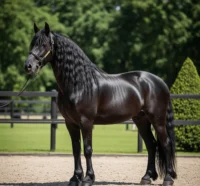
When it comes to choosing between horses and mules, many people find themselves debating which is the better option. While mules have certain advantages, horses offer a unique set of qualities that make them stand out in various aspects. Horses have been companions to humans for thousands of years, serving in roles ranging from transportation to agriculture and sport. Their versatility, speed, and trainability have made them indispensable in many cultures worldwide.
“We use trusted facts and real experience to help you understand the benefits of horses.”
- Superior Speed and Agility
Horses are renowned for their speed and agility, traits that make them exceptional in racing, sports, and quick transportation. Their leaner build and longer legs allow them to cover ground faster than mules. This makes them ideal for activities like racing, polo, and quick-response tasks. The horse’s ability to accelerate quickly and change direction with ease gives it an edge in competitive environments. Whether it’s sprinting across a track or maneuvering through an obstacle course, horses’ speed and agility are unmatched.
- Easier to Train
Horses generally have a more cooperative nature when it comes to training. Their eagerness to please and responsiveness to commands make them easier to train compared to mules. While mules are intelligent, they can sometimes display a more independent streak, which may require more patience and consistent training methods. Horses, on the other hand, often learn new tasks more quickly and are more adaptable to various training techniques. This makes them a preferred choice for riders and trainers seeking a responsive and trainable companion.
- Versatility in Sports and Work
Horses excel in a wide range of activities, from competitive sports like show jumping and dressage to work-related tasks such as herding cattle and pulling carriages. Their athleticism and trainability allow them to perform in diverse disciplines. Mules, while strong and sure-footed, are not as commonly used in competitive sports due to their different movement styles and temperaments. Horses’ versatility makes them suitable for various roles, adapting to different tasks and environments with ease.
- Stronger Social Bonds with Humans
Horses often form deep, emotional bonds with their human handlers. Their social nature and sensitivity to human emotions make them excellent companions. This strong bond can enhance training, improve performance, and create a fulfilling relationship between horse and rider. While mules can also form attachments, their more independent nature may not foster the same level of emotional connection. The horse’s ability to connect emotionally with humans adds a unique dimension to their partnership.
- Better for Competitive Racing
In the realm of competitive racing, horses are the undisputed champions. Their speed, stamina, and agility make them the preferred choice for events like thoroughbred racing and endurance competitions. Mules, due to their different physical build and gait, are not typically used in racing. The horse’s specialized breeding and training for speed give it a distinct advantage in competitive racing scenarios.
- More Suitable for Children and Beginners
Horses, especially those with calm temperaments, are often more suitable for children and beginner riders. Their size and strength can provide a sense of security, and their responsiveness to commands makes them easier to handle. Mules, while intelligent and strong, may require more experienced handlers due to their independent nature. The horse’s trainability and willingness to work with humans make it a popular choice for novice riders.
- Greater Availability and Variety
Horses are more widely available and come in a greater variety of breeds and temperaments compared to mules. This diversity allows potential owners to select a horse that best fits their needs, whether for work, sport, or companionship. Mules are less common and are typically bred for specific purposes, limiting the options available to prospective owners. The wide availability of horses makes it easier to find one that matches an individual’s requirements.
- Easier to Sell or Lease
Due to their higher population and demand, horses are generally easier to sell or lease compared to mules. The broader market for horses increases the likelihood of finding a buyer or lessee. Mules, being less common, may have a more limited market, making transactions more challenging. The ease of selling or leasing horses provides flexibility for owners looking to transition or change their equine companions.
- Better for Mounted Police Work
Horses are commonly used in mounted police units due to their size, strength, and ability to navigate crowded or challenging environments. Their presence can be both a deterrent to crime and a means of crowd control. Mules, while strong and sure-footed, are not typically used in mounted police work due to their smaller size and different movement patterns. The horse’s suitability for mounted duties makes it a preferred choice in law enforcement.
- More Suitable for Parades and Ceremonial Roles
Horses are often chosen for parades and ceremonial roles due to their striking appearance and graceful movement. Their size and demeanor add to the grandeur of such events. Mules, with their different physical characteristics and gait, are less commonly used in these settings. The horse’s suitability for ceremonial roles enhances the visual and emotional impact of public events.
- Better for Long-Distance Travel
Horses are well-suited for long-distance travel due to their stamina and ability to maintain a steady pace over extended periods. Their endurance allows them to cover vast distances, making them ideal for activities like trail riding and long-distance trekking. Mules, while strong, may not have the same level of endurance over long distances. The horse’s capability for long-distance travel makes it a reliable companion for extensive journeys.
- Easier to Groom and Care For
Horses generally require less specialized care and grooming compared to mules. Their coats are easier to maintain, and they typically have fewer health issues that require attention. Mules, due to their different physiology, may require more specialized care and attention. The relative ease of grooming and care for horses makes them more convenient for many owners.
- Stronger Historical Significance
Horses have played a significant role throughout history, from warfare to agriculture to transportation. Their contributions have shaped civilizations and cultures worldwide. While mules have also been important, especially in specific contexts, horses’ broader historical significance is more widely recognized. The horse’s enduring impact on history underscores its importance in human development.
- Better for Herding Livestock
Horses are commonly used for herding livestock due to their speed, agility, and ability to cover large areas. Their natural instincts and training make them effective in managing and moving animals. Mules, while strong and sure-footed, are not typically used for herding due to their different movement styles and temperaments. The horse’s effectiveness in herding enhances livestock management practices.
- More Suitable for Therapeutic Riding Programs
Horses are widely used in therapeutic riding programs due to their gentle nature and ability to form bonds with riders. Their movements can help improve balance, coordination, and emotional well-being. Mules, while intelligent and strong, are less commonly used in therapeutic settings. The horse’s suitability for therapeutic programs benefits individuals seeking physical and emotional healing.
- Greater Economic Impact
The horse industry contributes significantly to the economy through various sectors, including racing, breeding, agriculture, and tourism. Their widespread use and demand create jobs and generate revenue. Mules, while valuable in specific contexts, have a more niche market. The broader economic impact of horses underscores their importance in various industries.
Both mules and horses have unique strengths that cater to different needs. The choice between the two depends on the specific requirements of the tasks at hand and personal preferences. By understanding the characteristics of each, you can make an informed decision that aligns with your objectives.
Horse vs Mule: Pros & Cons Comparison Table
| Category | Horse | Mule |
| Species Origin | Equus ferus caballus (domesticated horse) | Hybrid of male donkey (jack) and female horse (mare) |
| Sterility | Fertile | Usually sterile (due to mixed chromosomes) |
| Physical Strength | Strong, but varies by breed | Stronger than a horse of the same size; excellent stamina and endurance |
| Endurance | Good endurance, especially in light and draft breeds | Exceptional endurance; preferred for long, tough terrain |
| Surefootedness | Good, but less sure-footed on rocky or uneven terrain | Superior; excels in mountains or rocky areas |
| Intelligence | Intelligent but can be flighty | Very intelligent; more cautious and less likely to panic |
| Temperament | Sensitive, excitable, quick to bolt | Calm, patient, and deliberate; less reactive |
| Trainability | Highly trainable; responsive to human commands | Trainable, but requires more patience; won’t perform tasks they see as unsafe |
| Workload Tolerance | Can fatigue or overheat more quickly | Tolerant of heat and long working hours; needs less food |
| Pain Tolerance | Moderate | High pain tolerance; often less prone to injury |
| Longevity | 25–30 years typically | 30–40 years; often lives longer than horses |
| Health Issues | Prone to colic, lameness, and breed-specific ailments | Fewer health issues; less prone to colic |
| Hoof Care | Needs regular trimming/shoeing | Hardier hooves; may need less frequent care |
| Feeding Requirements | Higher nutritional needs | Efficient metabolism; eats less and handles poorer-quality forage better |
| Breeding | Breedable (various purebred lines exist) | Cannot reproduce (usually sterile) |
| Speed | Faster; bred for racing and agility | Slower but more steady |
| Noise/Vocalization | Neighs/whinnies | Bray (loud and distinctive) |
| Aesthetics | Elegant; variety of breeds, colors, and types | Less elegant; more utilitarian appearance |
| Cultural/Historical Use | Widely used in sports, warfare, and culture | Historically used in agriculture, military, and transport in tough terrain |
| Sports/Competition | Dominates in sports: racing, jumping, dressage, rodeo | Rare in competition; not recognized in some breed/sport registries |
| Legal/Registry Status | Fully recognized in breed registries | Limited recognition; not allowed in some official competitions (e.g., horse shows) |
| Cost | Expensive (especially purebred/sport horses) | Generally cheaper to purchase and maintain |
| Best Use Cases | Racing, sport, leisure riding, showing | Pack animals, farming, rugged trail riding, developing countries |
| Behavioral Risks | May bolt when scared; herd instinct can dominate | Less likely to panic; more independent and stubborn at times |
| Grooming Needs | High, especially in show horses | Moderate to low grooming needs |
| Adaptability to Climate | Less heat-tolerant | Extremely heat-tolerant; thrives in harsh climates |
| Relationship with Humans | Strong bonding with consistent handling | Bonds well but may not be as affectionate; more independent |
Horse Vs Mule – In A Nutshell

In the debate of horse vs mule, both animals offer unique advantages. Horses are renowned for their speed, agility, and versatility in various disciplines. Mules, on the other hand, are celebrated for their endurance, intelligence, and suitability for challenging terrains.
When deciding between a mule vs horse, consider the specific needs of your activities, the environment in which the animal will be used, and your ability to provide appropriate care and training. Both horses and mules can be valuable companions, each bringing distinct qualities to the table.

